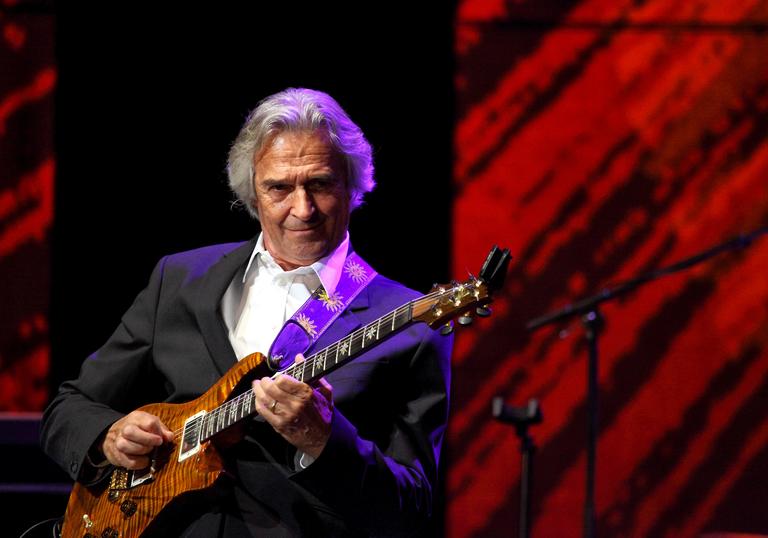John McLaughlin is delighted to bring one of his longest serving groups, The 4th Dimension, to the Barbican after the frustration of cancelling tours during the Covid-19 pandemic. “We are thrilled to be able to play live again as it’s really been rugged and very tough,” he says.
The guitarist has also experienced arthritis in his right hand, and although rumours of his retirement were exaggerated, it caused a major problem, which he has now solved through a combination of conventional medicine and meditational techniques.
“I started by telling my hands how amazing they are and how grateful I am,” he explains. “I believe in the mind over the body, but you must persevere, you have to have faith, and I have been out of pain completely for the last three and a half years. “
McLaughlin is one of the most important and influential guitarists of the last half century. As a boy he was learning violin and piano, but when he first played a D chord on a guitar, aged 11, the love affair began. He started out playing blues and had his head turned by hearing jazz guitarist Django Reinhardt and flamenco players.
From the early 1960s, McLaughlin played sessions and graduated through the UK jazz and blues scenes. In 1969 he moved to New York to play in Lifetime, the jazz-rock power trio with drummer Tony Williams and keyboard player Larry Young. This led him to realise a dream by playing with Miles Davis, most notably on his landmark 1970 album Bitches Brew. He made a series of solo albums, and in 1971, formed the epochal jazz-fusion group Mahavishnu Orchestra. His interest in Eastern music manifested in 1974 with the acoustic group Shakti. McLaughlin’s playing has always been hallmarked by advanced technique and harmonic invention. At times he plays at such astonishing speed it feels like he is trying to achieve an ecstatic state.
“If you look at it in the athletic terms then maybe you have a point, because if I could run the hundred metres in under 10 seconds I would be thrilled beyond belief,” he says with a smile. But this remarkable facility was initially born from necessity. McLaughlin recalls at 16 years old asking to sit in with a band during a pub session and making a “catastrophic” attempt at playing a high-speed version of the jazz standard ‘Cherokee’. He then got down to some serious practice. “I came back six months later and I was able to hold my own, to a degree,” he recalls. “Later on, I learnt from John Coltrane and Miles Davis, and I thought if that’s the benchmark, I have to be able to keep up.”
He cites Coltrane as a major influence on his playing, particularly the saxophonist’s ability to go “beyond technique”: “I’ve often been asked, ‘Are you dominated by your technique?’ And sometimes I have confessed to it, but I continue to work in the hope that maturity will bring a little wisdom with it. I’m 80 years old, so I hope so!”
The 4th Dimension were formed in 2007 and have been likened to the Mahavishnu Orchestra in their approach. The group’s name derives from “living in the fourth dimension because the art of music is sculpted in time and space,” McLaughlin explains. “They’re all notes but it’s where you put them in time and space that makes them worth something.
“I wanted the quartet format “, he continues. “As far as making improvised music is concerned it’s not too big, but it contains everything, especially if there is a keyboard. And we have a double plus here with Gary Husband who plays piano and keys and is also a phenomenal drummer. Sometimes he plays double drums with Ranjit Barot, who is an amazing drummer. He was born in India and he’s the one, in my opinion, who has most successfully integrated these marvellous Indian rhythmic traditions, which themselves are fine arts, into Western playing.
“Étienne M’Bappé, our bass player, originally comes from Cameroon and is now living in Paris. He’s such an amazing player. He can basically play anything I write, so for bringing a musical idea into fruition, these people are very important to me.”
Barot also studied the Southern Indian singing style Konnakol and performs it onstage with The 4th Dimension, along with McLaughlin, who was taught the technique by Ravi Shankar. “This Konnakol, the singing of rhythms, is not just a great aspect of Indian music. I think it’s very good for anyone in the West, especially if you improvise with a drummer,” he says. “The sound of the human voice is the most beautiful musical sound. If reincarnation exists, I want to come back as a singer.”
To maintain his standards, McLaughlin still practices guitar assiduously. “I don’t even consider it practice anymore,” he says. “I play every day because it does so much for my spirits and my mental outlook. I think it’s one of the elements that’s kept me healthy all these years.”







